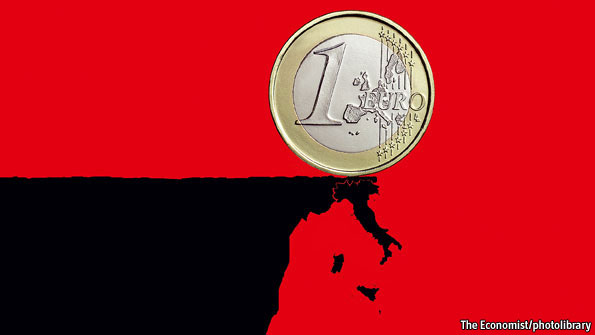‘Deep Recession IS The Greatest Depression’
– Italy remains in deep recession, fueling fears the country may be next after Spain to need aid (Washington Post, June 11, 2012):
MILAN — The confirmation on Monday that Italy’s recession is deepening heightens pressure on Premier Mario Monti’s government, which is struggling to fend off the debt crisis and the perception that Italy could be next to seek a bailout following Spain’s decision to ask for help for its ailing banks.
Official statistics confirmed that Italy’s economy contracted by a quarterly rate of 0.8 percent in the first three months of the year, the worst contraction in three years and significantly more than in Spain, whose economy contracted 0.4 percent.
While Italy’s first quarter performance was affected by one-offs like a transport strike that hurt sales of durable goods like cars, the second quarter is expected to be equally dire — experts predict a contraction of between 0.6 percent and 0.7 percent.
IHS analyst Raj Badiani called the numbers “appalling.”
“The focus is on Italy and the risk is high. The Italian government has to deliver on its reform agenda. Any relapses to the old Italian ways will lead to another spike in bond yields, which could see them overtake Spanish bond yields. The situation is fragile,” said Badiani.
Already on Monday investors were showing signs of unease over Italian bonds. The interest rates on Italy’s 10-year bond jumped to 5.83 percent by late afternoon from below 5.50 percent at the start of trading. Market sentiment will be tested in a pair of bond sales this week to service Italy’s debt of more than €1.9 trillion ($2.4 trillion).
Most of Italy’s economic indicators are stronger than Spain’s. While its overall debt is high, its deficit is low — at 3.9 percent of GDP compared with Spain’s 8.5 percent. The country avoided a big real estate bubble like Spain’s, meaning its banks are in better shape, and private saving is high.
The problem, said sovereign debt expert Nicholas Spiro, is that Spain’s admission that its banks need a bailout gives rise to what he called “bailout creep,” the idea in international markets that Italy will be the next domino to fall.
“Where Spain goes, there is the perception that Italy will follow, which is terrible because it is like comparing apples and pears,” Spiro said, noting that Italy’s economic situation is “infinitely better.”
For Italy, the political situation will be key to confidence in its financial future. Monti has widespread political backing for his reforms, but support has become shaky of late, with major parties, unions and the business lobby criticizing the technocratic government. A key fear stalking Italy’s financial markets is that Monti may eventually lose political support and have to call early elections without having pushed through the reforms Italy needs so urgently.
“Italy is facing the worst of both worlds right now: a dramatic deterioration in the external environment and increased political and economic instability risks at home,” he said.
To assure markets that it can achieve economic growth and reduce its debts, Italy needs to keep on its reform course. The economy is predicted to shrink by 1.7 percent this year, according to OECD estimates. As the economy contracts, debt as a percentage of the overall economy is forecast to rise, to 123 percent in 2012 from 120 percent last year.
Badiani said Monti needs to deliver persuasive labor and wage reforms, while finding ways to reduce public pension spending, which accounts for 15 percent of GDP. He expects the government will avoid increasing the value added tax this fall in a bid to help turn around falling consumption, particularly of big-ticket items like cars.
Italy’s fate is also in the hands of European policy makers, and depends on the willingness to set up firewalls or come up with other tools to stem contagion. Monti and the new French President Francois Hollande favor the creation of Eurobonds, jointly issued European debt, to spread out the risk of debt. That would lower borrowing rates for countries like Italy, significantly easing market tensions. The French and Italian leaders meet in Rome on Thursday.
